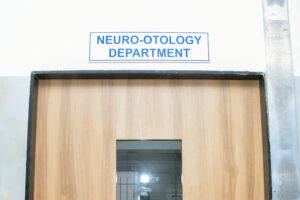Vertigo Lab
Overview
Vertigo is a symptom of an underlying condition. Diagnosis of that condition is based on history and investigations. Vertigo alone may be diagnosed by patient’s accounts of his or her experiences. Three quarters of patients with vertigo complain of dizziness. True vertigo usually means a feeling of the “world spinning around” rather than just feeling dizzy or light headed.

Causes of vertigo
Vertigo may be caused by diseases of the central nervous system or those of the inner ear.
Diagnosis attempts to distinguish between causes in the inner ear or in the brain.
From history, the trigger of the vertigo may be assessed. This helps to determine the cause of the condition.
For example, a change in position of the head brings about vertigo in Benign paroxysmal positional vertigo (BPPV), in labyrinthitis, or in some brain tumors.
Those episodes that precipitate without an apparent cause include Ménière’s disease, migraine, multiple sclerosis, and stroke.
Usually, a middle ear infection or respiratory tract infection precedes vestibular neuronitis.
Stress precipitates vertigo due to a psychological cause or vertigo due to migraine.
The duration of vertigo is also indicative of the underlying cause. It may last a few seconds to a few minutes in Ménière’s disease, vestibular neuronitis, BPPV, etc.
It may last for hours in the early stages of Ménière’s disease, migraine, or due to injury or surgery.
In stroke, migraine, multiple sclerosis, or psychological causes of vertigo, a single episode may last for days or weeks.
Initial stages of acute vestibular neuronitis manifest with severe vertigo, while in Ménière’s disease, the attacks of vertigo initially increase in severity, then lessen in severity as the disease progresses.
